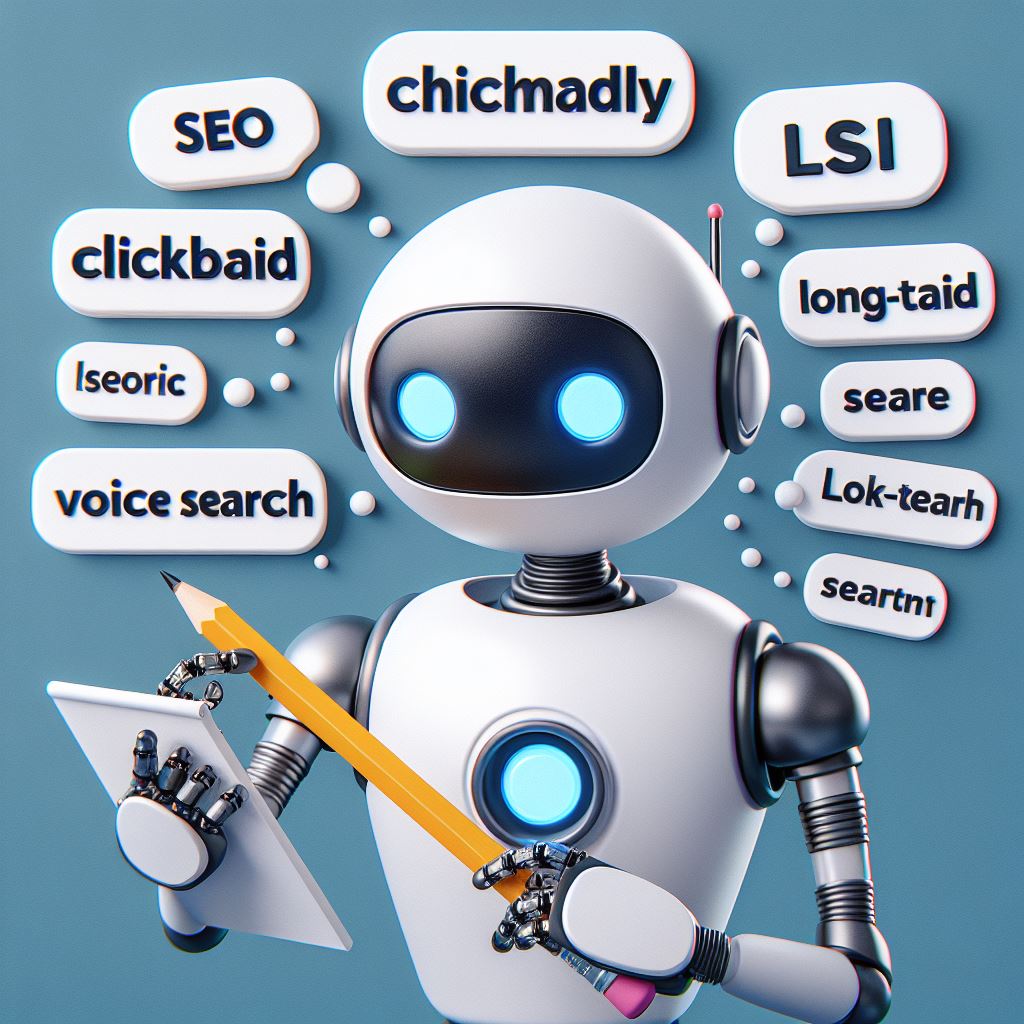Introduction
Keywords are the words and phrases that your target audience uses to search for your website, products, or services online. They help you rank higher on search engines, drive more traffic to your website, and convert more visitors into customers.
But finding and generating keywords manually can be a pain in the neck. You have to spend hours researching your niche, analyzing your competitors, brainstorming ideas, and testing results. And even then, you might end up with keywords that are too generic, too competitive, or too irrelevant for your website.
AI tools are software applications that use artificial intelligence and machine learning to automate and improve the keyword research process. They can help you generate a list of targeted keywords, create catchy headlines, and optimize your SEO, in a matter of minutes.
In this blog post, I will show you how AI tools work and what they can do for you. I will also compare them with other methods of keyword research, and give you some tips and best practices for using them effectively and efficiently. By the end of this post, you will have a clear idea of why AI tools are the best way to create catchy and relevant keywords for your website.
AI Keyword List Generator
One of the AI tools that can help you with keyword research is the AI Keyword List Generator. This tool can generate a list of targeted keywords based on your main topic, industry, and competitors, using machine learning and natural language processing.
How does it work? It’s simple. You just enter your main topic, such as “dog grooming”, and the tool will analyze your industry, your competitors, and your target audience, and generate a list of relevant keywords for you. You can also filter the keywords by search volume, competition, or difficulty, and sort them by relevance, popularity, or alphabetically.
For example, let’s say you want to generate a list of keywords for your dog grooming website. You can use the AI Keyword List Generator to help you with that.
Here is a possible list of keywords that the tool can generate for you:
- dog grooming near me
- dog grooming tips
- dog grooming salon
- dog grooming prices
- dog grooming supplies
- dog grooming scissors
- dog grooming brushes
- dog grooming courses
- dog grooming videos
- dog grooming styles
As you can see, the tool can generate a list of keywords that are relevant, specific, and diverse for your website. You can use these keywords to create content, optimize your SEO, and target your audience.
AI Headline Generator
Another AI tool that can help you with keyword research is the AI Headline Generator. This tool can generate catchy and engaging headlines for your website pages, blog posts, and articles, using artificial intelligence and creativity.
How does it work? It’s simple. You just enter your main keyword, such as “dog grooming”, and the tool will generate a headline for you, using natural language generation and copywriting techniques. You can also choose the headline type, such as list, how-to, question, or statement, and the headline tone, such as funny, emotional, or informative.
For example, let’s say you want to generate a headline for your blog post about dog grooming. You can use the AI Headline Generator to help you with that.
Here is a possible headline that the tool can generate for you:
- How to Groom Your Dog Like a Pro in 10 Easy Steps
- The Ultimate Guide to Dog Grooming Supplies and Tools
- 7 Reasons Why You Should Hire a Professional Dog Groomer
- What Your Dog’s Grooming Style Says About Their Personality
- How to Save Money on Dog Grooming Without Compromising Quality
As you can see, the tool can generate a headline that is catchy, engaging, and relevant for your blog post. You can use this headline to attract more readers, increase your click-through rate, and boost your conversions.
AI Keyword Generator
Another AI tool that can help you with keyword research is the AI Keyword Generator. This tool can generate relevant and high-performing keywords for your website’s SEO, using data analysis and optimization.
How does it work? It’s simple. You just enter your website URL, and the tool will scan your website, analyze your content, and generate keywords for you, using keyword research and SEO best practices. You can also enter your competitors’ URLs, and the tool will generate keywords that can help you outrank them.
For example, let’s say you want to generate keywords for your dog grooming website’s SEO. You can use the AI Keyword Generator to help you with that.
Here is a possible list of keywords that the tool can generate for you:
- best dog grooming near me
- how to groom a dog at home
- dog grooming services and reviews
- dog grooming products and accessories
- dog grooming trends and tips
As you can see, the tool can generate keywords that are relevant, high-performing, and SEO-friendly for your website. You can use these keywords to optimize your website, rank higher on search engines, and drive more organic traffic to your website.
Comparison and Contrast
Now that you know how AI tools can help you with keyword research, you might be wondering how they compare with other methods of keyword research, such as manual research, keyword planner, or keyword tool.
Here is a comparison and contrast of each method, and their strengths and weaknesses:
- Manual Research: This is the traditional method of keyword research, where you use your own knowledge, intuition, and creativity to find and generate keywords. You can use sources such as Google, Wikipedia, Quora, or Reddit to get ideas and inspiration. The strength of this method is that it is free, flexible, and personalized. The weakness of this method is that it is time-consuming, tedious, and limited. You might miss out on some keywords, or end up with keywords that are not relevant, specific, or diverse enough for your website.
- Keyword Planner: This is a tool that Google provides for advertisers to find and generate keywords for their ads. You can use this tool to get keyword ideas, search volume, competition, and bid estimates. The strength of this tool is that it is reliable, accurate, and data-driven. The weakness of this tool is that it is focused on ads, not SEO or content. You might get keywords that are too generic, too competitive, or too irrelevant for your website.
- Keyword Tool: This is a tool that uses Google’s autocomplete feature to find and generate keywords for your website. You can use this tool to get keyword suggestions, questions, prepositions, and related searches. The strength of this tool is that it is simple, fast, and user-friendly. The weakness of this tool is that it is limited, basic, and repetitive. You might get keywords that are not diverse, specific, or engaging enough for your website.
- AI Tools: These are tools that use artificial intelligence and machine learning to find and generate keywords for your website. You can use these tools to get keyword lists, headlines, and SEO keywords, using natural language processing, data analysis, and optimization. The strength of these tools is that they are powerful, easy, and creative. The weakness of these tools is that they are not perfect, cheap, or human. You might get keywords that are not accurate, affordable, or natural enough for your website.
Tips and Best Practices
Finally, I want to share with you some tips and best practices for using AI tools for keyword research effectively and efficiently.
Here are some things that you should do:
- Define your goals: Before you use any AI tool, you should have a clear idea of what you want to achieve with your keywords, such as increasing your traffic, ranking higher, or converting more. This will help you choose the right tool, the right settings, and the right keywords for your website.
- Refine your keywords: After you use any AI tool, you should not just blindly accept the keywords that it generates for you. You should always check the keywords for relevance, specificity, and diversity, and filter, sort, or edit them as needed. You should also use your own knowledge, intuition, and creativity to add, remove, or modify the keywords as you see fit.
- Test your results: After you use any AI tool, you should not just assume that the keywords that it generates for you will work for your website. You should always test the keywords for performance, competition, and effectiveness, and measure, analyze, or optimize them as needed. You should also use tools such as Google Analytics, Google Search Console, or Moz to track, monitor, or improve your keywords as you go.

Conclusion
In this blog post, I have shown you how AI tools work and what they can do for you. I have also compared them with other methods of keyword research, and given you some tips and best practices for using them effectively and efficiently.
AI tools are the best way to create catchy and relevant keywords for your website, as they can help you generate a list of targeted keywords, create catchy headlines, and optimize your SEO, in a matter of minutes. They are powerful, easy, and creative, and they can save you time, effort, and money.


Hello to all, the contents present at this website are truly remarkable for people experience, well,
keep up the nice work fellows.
Feel free to surf to my blog … vpn 2024
I want to to thank you for this great read!! I certainly enjoyed every bit of it.
I have you book marked to check out new things you post…
My site :: vpn special coupon code 2024
Hey there excellent website! Does running a blog similar to this require
a massive amount work? I’ve no understanding of coding however I was
hoping to start my own blog soon. Anyway, if you have any suggestions or
techniques for new blog owners please share. I know
this is off subject but I simply needed to ask.
Appreciate it!
Feel free to visit my homepage; vpn coupon 2024
This design is wicked! You most certainly know how to keep a reader entertained.
Between your wit and your videos, I was almost moved to start
my own blog (well, almost…HaHa!) Great job.
I really enjoyed what you had to say, and more than that, how you presented it.
Too cool!
my page – vpn coupon code 2024
I every time spent my half an hour to read this blog’s articles daily along with
a mug of coffee.
my web site: vpn special coupon
Thank you for the auspicious writeup. It in fact was once a entertainment account it.
Glance complex facebook vs eharmony to find love online far added agreeable from you!
However, how can we communicate?
Your point of view caught my eye and was very interesting. Thanks. I have a question for you.
My relatives always say that I am wasting my time here at web,
but I know I am getting experience everyday by reading
such good articles.
Have a look at my web blog … nordvpn special coupon code 2024